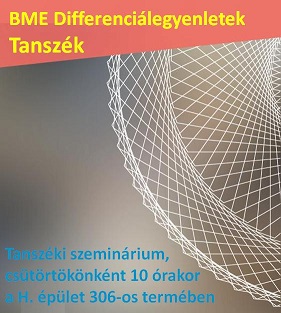2018. szeptember 12.

20 September 2018, 10:15-12:00, H607 (!)
Professors Gustaf Söderlind and Carmen Arévalo will present three talks during their visit to Budapest. All three talks deal with adaptive methods of ODEs. Professor Söderlind’s first talk will be held at the Seminar on Applied Analysis of the Department of Applied Analysis at ELTE university (details below), while his second talk together with Professor Arévalo’s talk will be presented at the Miklós Farkas Seminar. Although professor Söderlind’s talks form a complete presentation together, yet they can be followed separately.
 10:15-11:00
10:15-11:00
Gustaf Söderlind (Lund University, Sweden)
Adaptive Time-Stepping. Part II. Time transformations applied to reversible Hamiltonian dynamics and weakly dissipative systems
In the second talk on time step adaptivity, we focus on the special needs of conservative dynamical systems. This includes Hamiltonian problems, and weakly dissipative systems. In integrable Hamiltonian problems, the mathematical solution is time reversible, which precludes the use of classical controllers, which adapt the step size to manage the error observed in previous steps. Instead, a time reversible tracking algorithm is developed, which allows full reversibility of the adaptive computational process. This is shown to preserve first integrals over long times, and even improves the accuracy over constant step size symplectic integrators. We demonstrate the procedure in two examples from celestial mechanics, and then proceed to demonstrate how a similar approach can be combined with splitting methods in weakly dissipative systems. The latter approach has been put to effective use in rolling bearing dynamic simulation.
The first part of the talk:
Adaptive Time-Stepping. Part I. How control theory and digital filters enhance the performance of IVP solvers
Seminar on Applied Analysis, 17 September 2018, 14:00, Department of Applied Analysis and Computational Mathematics, ELTE, Pázmány P. 1/C, room 3.719
In two talks we will describe a systematic approach to time-stepping adaptivity in the numerical integration of initial value problems. The first part will deal with the proper construction of discrete controllers that keep the local error equidistributed along the solution trajectory. The controllers will be based both on classical constructions such as proportional-integral controllers, and on modern digital low-pass filters, which are designed to maintain a smooth step size sequence. We will demonstrate that a regular step size sequence is of benefit as it increases the computational stability — small changes in the error tolerance will only produce a small change in the accuracy of the computed solution. While computational speedup is often only modest, the quality of the computed solution as well as the reliability of the software can sometimes be remarkably improved.
